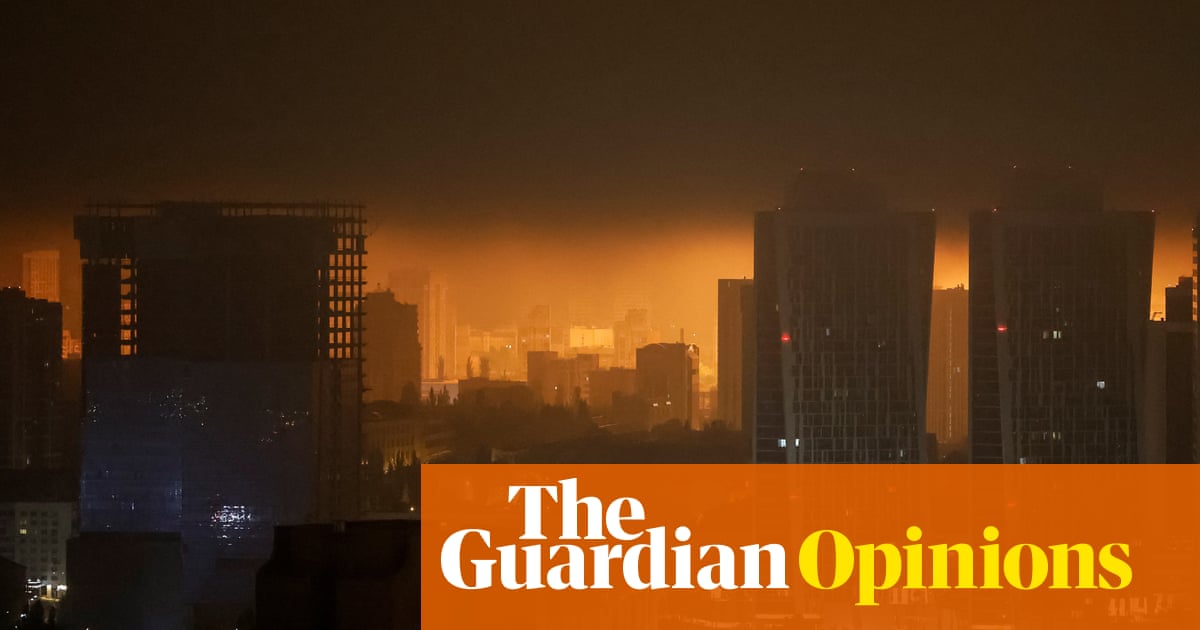Three-plus years into the war in Ukraine, much remains uncertain, including when the bloodshed will cease and on what terms. But we can be sure about one thing: although no one took seriously Donald Trump’s boast that he would end the warwithin 24 hours– perhaps not even Trump himself – it’s now evident that his efforts to stitch together a political settlement have failed. Last weekend’s Russian drone and missile strikes against Ukraine, reportedly among the largestsince the full-scale invasion began, show us that the conflict isn’t likely to come to a sudden end.
That’s becauseVladimir Putinremains committed to his goal of conquering Luhansk, Donetsk, Zaporizhzhia and Kherson provinces. So far, he controls virtually all of the first and most of the other three. A deal that gives him what he has now plus a guarantee that Ukraine will remain outside Nato won’t satisfy him. He has said repeatedly that he wants all four of these provinces and a neutral Ukraine, with caps on the number of soldiers and major armaments it can deploy.
Trump’s mistake has been to assume that his self-proclaimed deal-making genius, supposed rapport with Putin and massive leverage over Volodymyr Zelenskyy (the US has provided Ukrainewith more weaponrythan the other allies combined, though less total aid when humanitarian and other support is included) would together yield a diplomatic success, perhapsone that would evenland him a Nobel peace prize.
But with Russia targeting Ukraine, including Kyiv, with367drones and missilesover the past few days, this isn’t merely a display of disdain by Putin for any political settlement that falls short of his goals, and a demonstration that he is committed to continuing the fight until he achieves his objectives. It also makes Trump seem weak.
Now Trump is outraged – Putin, hewrote on his social media platform, has “gone absolutely CRAZY” and is “needlessly killing a lot of people” – and, when asked whether he was thinking of tightening sanctions, replied: “Absolutely.” But this isn’t the first time Trump has warned Putin to cease targeting his missiles and drones on Ukraine (remember his “Vladimir, STOP!” post late last month?) or threatened additional sanctions.
This is an obvious trend in the relationship. Putin is still committed to his publicly stated goals, and rebuffs Trump’s flattery and bullying in equal measure. Unsurprisingly, he showed no interest in Trump’s proposal for a 30-day ceasefire, which Zelenskyy promptly accepted. Nor was Putin unnerved byTrump’s threat, in late April, to impose secondary sanctions on Russia unless it stopped “shooting missiles into civilian areas, cities and towns”. This warning came after Trump’s meeting with Zelenskyy at Pope Francis’s funeral and may have given the Ukrainian president hope, but it didn’t rattle his Russian counterpart. Nor did Trump’sintimation in Marchthat Russia risked further sanctions unless it demonstrated its commitment to peace.
As a gesture to convey that he wasn’t ignoring Trump’s diplomatic démarches, Putin did propose that Russia andUkrainemeet face-to-face. Zelenskyy, ever eager to convince Trump that he is doing his bit, sent a high-level delegation to the Istanbul talks and even went to Ankara himself. Putin sent second-tier panjandrums with no authority to offer anything substantial. And Trump offered to reorganise his trip to the Gulf monarchies and fly to Turkey if Putin did as well, claiming that only a meeting between him and Putin would produce a diplomatic breakthrough.
The flattery didn’t entice Putin, who remained in Moscow. The two leaders did have a phone conversation, but nothing meaningful came of it. After that, Trump seemed resigned to failure, though he’d never call it that, andreverted to the narrativethat “this was not our war” and that Europe should assume responsibility for supporting Ukraine’s security and brokering an end to the conflict.
However, even if Trump moves beyond social media posts and words and actually does impose additional economic penalties onRussiathis time round, the fighting won’t stop – for at least two reasons.
First, Putin owns this war and has therefore staked his political standing on achieving his goals, no matter the costs, which have been enormous. There has been much debate about the number of Russian military casualties, but the estimates runas high as 900,000, includingwell over 100,000dead. And though the war has hardly brought Russia’s economy to the brink of collapse, it has been a significant burden. Military spendingincreased by 46%between 2022 and 2024 and accounted forabout 35%of total government spending in the latter year, with the proportion projected to reach 37% this year. Inflation reached10.23% last month, forcing the central bank to keep itsinterest rate at 21%. Putin’s job isn’t at risk, but he would be politically diminished if, after demanding sacrifices on this scale from Russians, he settled for half a loaf. So don’t expect that he will be forced to compromise because of blood and treasure being devoured by the war.
Second, as Trumptold European leadersafter his phone call with Putin, the Russian leader seems convinced that his army is winning. Perhaps Putin doesn’t know the full extent of Russian losses – which, in addition to the casualties,include an estimated 14,000 tanks, armoured fighting vehicles and artillery systems – because his generals fear bringing bad news to the boss. Perhaps he’s well-briefed but confident nevertheless that Russia’s superiority in every material measure of military might will eventually ensure victory, that the west will tire of the war and that Trump will abandon his pursuit of a deal and even end US military support to Ukraine.
No matter. The upshot is that no one should be surprised if, come February, this war enters its fifth year – and with no end in sight.
Rajan Menon is a professor emeritus of international relations at the City College of New York and a senior research scholar at Columbia University’s Saltzman Institute of War and Peace Studies
